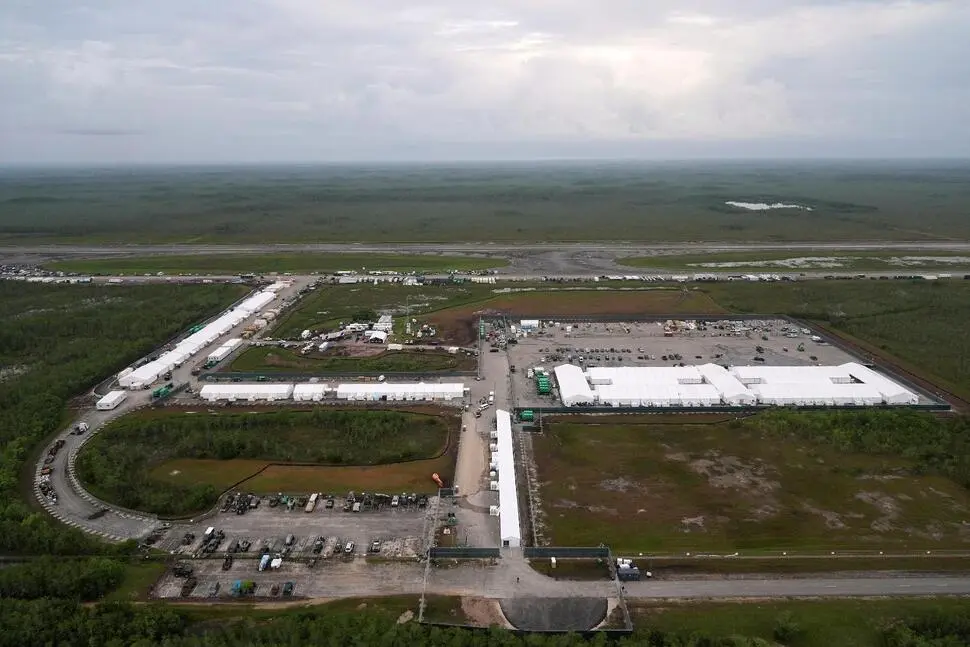Florida could be on the hook for the $218 million cost of converting an airport in the Everglades into an immigration detention center that may soon be empty of detainees
Florida’s $218M “Alligator Alcatraz” Immigration Facility Faces Shutdown Amid Legal and Environmental Battles
ORLANDO, Fla. — Florida could soon lose its $218 million investment in a controversial immigration detention center in the Everglades — nicknamed “Alligator Alcatraz” — after a federal judge upheld her decision to shut down the facility indefinitely.
The site, built in just days on the grounds of a remote training airport, is now facing an uncertain future as detainees are transferred elsewhere and equipment begins to be dismantled.
A Costly Shutdown
According to court filings, winding down operations will cost the state between $15 million and $20 million immediately. If Florida is later allowed to reopen the center, reinstalling its structures could add another $15 million to $20 million.
The Florida Division of Emergency Management acknowledged in court papers that most of the $218 million already spent to retrofit the airport for detention purposes will likely be lost.
An Associated Press analysis further revealed that Florida signed at least $405 million in vendor contracts to build and operate the facility, with officials originally projecting that running it would cost about $450 million annually. By late July, at least $245 million had already been allocated for operations, despite the site only opening on July 1.
Presidential Spotlight and Criticism
Former President Donald Trump toured the detention center last month, calling it a potential model for future facilities across the nation as his administration pushed for expanded deportation infrastructure.
But the center quickly gained notoriety for unsanitary conditions and reports that detainees were cut off from the legal system. Civil rights groups filed multiple lawsuits alleging “severe problems” at the site, including toilets that overflowed with fecal waste, despite the state reportedly allocating $50 million for portable bathrooms.
Judge Blocks Operations
U.S. District Judge Kathleen Williams ruled last week that Florida and federal officials violated federal law by failing to conduct a required environmental review before constructing the detention center in a sensitive wetlands region. On Wednesday, she rejected requests to pause her order, reinforcing that the facility must be wound down.
Williams said immigration enforcement would not be hindered by her decision, noting that the number of detainees was already dwindling. The Department of Homeland Security (DHS) confirmed Thursday that detainees were being transferred to other facilities.
Environmental activists monitoring the site said they had observed tents being dismantled, though trailers and portable restrooms remained.
A Broader Legal Battle
The Biden administration has argued that federal environmental law doesn’t apply in this case because the detention center was funded and operated by the state, not by federal agencies. Attorneys noted that no federal dollars have yet been spent on construction or operation, though Florida is seeking federal grants.
Nearly two dozen Republican-led states have joined Florida in urging an appellate court to overturn Judge Williams’ order, claiming she overstepped her authority.
Meanwhile, Governor Ron DeSantis’ administration is preparing to open a second facility, dubbed “Deportation Depot,” at a state prison in northern Florida.
Mounting Lawsuits
Civil rights groups are pursuing at least three lawsuits against the Everglades facility:
- One alleges detainees were denied legal access.
- Another challenges the environmental impact of the center.
- A third describes “previously unheard-of problems” in the U.S. immigration system stemming from conditions inside the camp.
With millions already spent, and legal battles far from over, the future of “Alligator Alcatraz” is uncertain — raising questions about the long-term cost of Florida’s immigration enforcement strategy.
